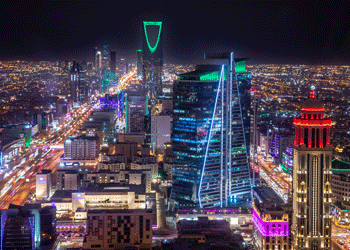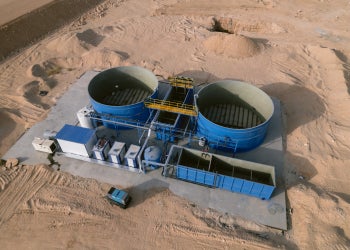Adnoc spurs downstream gas expansions
13 October 2023
 This package on the UAE’s downstream sector also includes:
This package on the UAE’s downstream sector also includes:
> Adnoc Gas picks site for planned LNG terminal
> Adnoc Gas receives prices for Estidama package
> Adnoc and Dusup sign key gas supply agreement
> Adnoc receives bids for gas pipeline packages
> Adnoc receives prices for sales gas pipeline packages
> Adnoc Gas awards $3.6bn Project Meram contract

Demand for natural gas has risen exponentially in this decade, with its share in the global energy mix set to grow further in the decades to come.
Regional energy producers are deploying major capital expenditure programmes to increase their gas production and processing capabilities to cater to growing demand.
The UAE is striving to achieve self-sufficiency in gas production by 2030. With this objective in mind, Abu Dhabi National Oil Company (Adnoc) has committed significant investment towards expanding its midstream and downstream gas capabilities.
These projects seek to increase the availability of gas for utility providers and industrial customers in the UAE and ramp up ethane output to grow the country’s petrochemical sector and its derivatives ecosystem.
 Hail and Ghasha galvanises UAE upstream market
Hail and Ghasha galvanises UAE upstream market
Ruwais LNG project
Adnoc Gas, the gas processing business of Adnoc, has finalised the location for its planned liquefied natural gas (LNG) export terminal. The facility will have the capacity to produce about 9.6 million tonnes a year (t/y) of LNG from two processing trains, each with a capacity of 4.8 million t/y.
The overall value of the planned project is estimated to be upwards of $4.5bn, based on capital expenditure by operators on similar schemes worldwide.
Adnoc Gas received technical bids from contractors in May for the engineering, procurement and construction (EPC) works on the project, which will be built in Ruwais Industrial City in Abu Dhabi’s Al-Dhafrah region.
Adnoc Gas had originally planned to build the LNG terminal in the UAE emirate of Fujairah, which sits outside the Strait of Hormuz on the coast of the Gulf of Oman. In early May, however, the company announced it was shifting the location of the project from Fujairah to Ruwais, Abu Dhabi.
Sales gas pipeline network
Adnoc Gas is progressing the Estidama project, which is crucial to enhancing Adnoc’s sales gas pipeline network across the UAE. The project aims to cater to rising demand for gas from industrial consumers across the UAE, particularly in the Northern Emirates.
Contractors submitted commercial bids in August for combined package numbers 4 and 7. The combined package involves laying a new pipeline from the Al-Shuwaib pig launcher and pig receiver station to the Sajaa gas facility in Sharjah.
The scope also covers building a new gas pipeline between BVS-2/KP28.7 in Abu Dhabi to Dubai’s Margham gas facility to meet increased gas demand from Adnoc Gas’ customer Dubai Supply Authority (Dusup).
EPC works on the estimated $2bn-plus Estidama project have been divided into seven packages. Abu Dhabi-based contractor Integrated Specialised General Contracting Company (Iscco) won package 1, understood to have a contract value of $18m, in December 2021.
In early July, Adnoc Gas awarded contracts worth a combined $1.34bn for two other packages of the Estidama project. UK-headquartered Petrofac was awarded the EPC contract for package 2 of the Estidama project, estimated to be worth $720m.
A consortium of Abu Dhabi’s National Petroleum Construction Company (NPCC) and Lebanon-headquartered CAT Group won Estidama package 3, which is valued at about $630m.
Contractors submitted technical bids for package 6 in August 2022 and commercial bids by 21 November. Work on package 6 entails the installation of a 52-inch, 74-kilometre pipeline from Sweihan to Al-Shuwaib in Abu Dhabi and building two block valve stations.
Package 5 is expected to be tendered separately to contractors as part of a planned second phase of the sales gas pipeline upgrade project.
As per the original project schedule, EPC works on the Estidama project are due to be completed in 2025.
Ramping up ethane output
Adnoc Gas is in charge of one of the world’s largest gas processing complexes in Abu Dhabi, with the capacity to process about 8 billion cubic feet a day from its Asab, Bab, Bu Hasa, Habshan and Ruwais plants.
Increased volumes of ethane production will allow the company to commercialise it to supply feedstock to Borouge for its under-construction Borouge 4 petrochemicals complex, as well as to derivatives plants in the upcoming Taziz complex. Adnoc Gas intends to achieve this through the Maximise Ethane Recovery & Monetisation (Meram) project.
Adnoc Gas awarded a $3.6bn contract for Project Meram to a consortium of NPCC and Spanish contractor Tecnicas Reunidas in early August, with EPC work on the project starting later that month. The scope of work on the contract includes commissioning new gas processing facilities to enable an optimised supply to the Ruwais industrial complex, Adnoc Group said.
The strategic Meram project aims to achieve dual objectives, Adnoc stated.
The first goal is to increase ethane extraction by 35 to 40 per cent from Adnoc Gas’ existing onshore facilities in the Habshan gas processing complex by constructing new gas processing facilities.
The second goal is to unlock further value from existing feedstock and deliver it to Ruwais via a 120km natural gas liquids (NGL) pipeline.
LATEST NEWS FROM THE UAE's CHEMICALS SECTOR:
> Lummus seeks to expand Abu Dhabi office
> Firms express interest for Abu Dhabi methanol project
> Borouge and Borealis launch recycled products range
> Fertiglobe makes $84m profit in second quarter
> Borouge announces $231m profit in second quarter
> Adnoc opens formal chemicals integration talks with OMV
Taziz chemicals complex
Meanwhile, investors in the Taziz petrochemicals derivatives-producing industrial complex in Ruwais are pushing ahead with their projects.
Taziz – a 60:40 joint venture (JV) of Adnoc and Abu Dhabi’s industrial holding company ADQ – is overseeing the development of the sprawling industrial complex, which will mainly draw ethylene feedstock from the Borouge 4 facility to produce several in-demand chemicals.
A JV of UAE-based Fertiglobe, South Korea’s GS Energy and Japanese investment firm Mitsui awarded Italian contractor Tecnimont the main EPC contract for its planned blue ammonia project in the Taziz Industrial Chemicals Zone in February.
The JV has appointed KBR to provide the technology licence, basic engineering design, proprietary equipment and catalyst for the low-carbon ammonia plant, which will have a capacity of 1 million t/y.
India’s Reliance Industries is also an investor in the Taziz complex, having forged a partnership with Taziz and Abu Dhabi-based Shaheen Chem Holdings Investment to invest $2bn in developing three chemical plants producing chlor-alkali (940,000 t/y), ethylene dichloride (1.1 million t/y) and polyvinyl chloride (360,000 t/y).
Switzerland-based Proman has committed to building the UAE’s first methanol plant at Taziz, with a planned production capacity of 1.8 million t/y. The Proman-Taziz JV completed the contractor prequalification process for the EPC tendering round for the methanol production project in August. The operator is expected to issue the main EPC tender later this year.
As projects in the first phase of the chemicals complex move forward, Taziz is also understood to be gearing up for a second phase to more than double the number of chemicals produced at the derivatives hub.
Exclusive from Meed
-
 Solar deals signal Saudi Arabia’s energy ambitions
Solar deals signal Saudi Arabia’s energy ambitions13 February 2026
-
 Saudi Arabia appoints new investment minister
Saudi Arabia appoints new investment minister13 February 2026
-
 Indian firm wins major Oman substation contract
Indian firm wins major Oman substation contract12 February 2026
-
 Developers appoint contractor for $500m wastewater treatment project
Developers appoint contractor for $500m wastewater treatment project12 February 2026
-
 Dewa raises Empower stake in $1.41bn deal
Dewa raises Empower stake in $1.41bn deal12 February 2026
All of this is only 1% of what MEED.com has to offer
Subscribe now and unlock all the 153,671 articles on MEED.com
- All the latest news, data, and market intelligence across MENA at your fingerprints
- First-hand updates and inside information on projects, clients and competitors that matter to you
- 20 years' archive of information, data, and news for you to access at your convenience
- Strategize to succeed and minimise risks with timely analysis of current and future market trends

Related Articles
-
 Solar deals signal Saudi Arabia’s energy ambitions
Solar deals signal Saudi Arabia’s energy ambitions13 February 2026
 Commentary
Commentary
Mark Dowdall
Power & water editorSaudi Arabia’s recent agreement to build $2bn-worth of solar power plants in Turkiye is the latest sign that the kingdom’s energy influence is changing.
Historically, this was measured in oil barrels and export volumes. Increasingly, this is extending to capital, structuring expertise and the ability to deliver record-low tariffs in competitive markets.
Announcing the deal, Turkish Energy Minister Alparslan Bayraktar said tariffs for the plants would be the country’s lowest on record, with electricity purchased under 25-year power purchase agreements.
It followed another announcement, in January, that Acwa is investing $200m to build a large-scale solar photovoltaic (PV) plant in the Philippines.
Whether Saudi-backed companies ultimately retain long-term stakes or primarily develop and build the assets, their role at the front end is significant.
Sponsors that bring sovereign backing, clear procurement processes and access to low-cost financing can influence tariffs and contract terms from the outset.
There is also a geopolitical layer. Investing in Turkiye, or anywhere for that matter, strengthens political and economic ties at a time when regional alignments are shifting.
Energy infrastructure is also long-term by its nature. It connects ministries, regulators, lenders and operators in relationships that often extend well beyond a single transaction.
Saudi Arabia has spent the past few years refining its approach to pricing, structuring and financing large-scale renewables at home.
Exporting that expertise may not rival oil in scale or visibility, but it does signal that Saudi Arabia is becoming more than just an energy supplier.
Increasingly, it is becoming a participant in how other countries design and finance their energy transitions. That influence is still significant.
https://image.digitalinsightresearch.in/uploads/NewsArticle/15645903/main.jpg -
 Saudi Arabia appoints new investment minister
Saudi Arabia appoints new investment minister13 February 2026
Register for MEED’s 14-day trial access
King Salman Bin Abdulaziz Al-Saud has made a series of senior government changes, including Khalid Al-Falih leaving his role as investment minister to become minister of state and a member of the cabinet.
Al-Falih has been replaced by Fahad Al-Saif as investment minister. Al-Saif has been head of the Investment Strategy and Economic Insights Division at the Public Investment Fund (PIF) since 2024. That role involved formulating PIF’s long-term investment strategy. He has also served as head of the Global Capital Finance Division, a role he has held since joining PIF in 2021.
The change of investment minister comes at a time when securing investments has become a key priority for Saudi Arabia as it prepares to hand over more projects to the private sector for delivery.
King Salman also named Abdullah Al-Maghlouth as vice-minister of media and Abdulmohsen Al-Mazyad as vice-minister of tourism. Khalid Al-Yousef was named attorney general, and Sheikh Ali Al-Ahaideb will serve as president of the Board of Grievances.
Faihan Al-Sahli was selected as director general of the General Directorate of Investigation, while Abdulaziz Al-Arifi was chosen to lead the National Development Fund. Haytham Al-Ohali will head the Communications, Space and Technology Commission, and Fawaz Al-Sahli will chair the Transport General Authority.
https://image.digitalinsightresearch.in/uploads/NewsArticle/15645415/main.gif -
 Indian firm wins major Oman substation contract
Indian firm wins major Oman substation contract12 February 2026

India’s Larsen & Toubro has won a contract to build the Majan 400/220/132kV grid station in Oman.
Estimated to cost $100m, the project includes an associated 400kV line-in line-out underground cable from Sohar Free Zone to the Sohar Interconnector Station.
The contract was awarded by Oman Electricity Transmission Company (OETC), part of the government-owned Nama Group.
The grid station will comprise eight 400kV gas-insulated switchgear (GIS) bays, eight 220kV GIS bays and 10 132kV GIS bays at the new Sohar Free Zone substation.
The scope includes the installation of two 500MVA, 400/220kV transformers and two 500MVA, 220/132kV transformers.
Local firm Monenco Consulting Engineers was appointed in April last year to provide design and supervision services for the project.
As MEED exclusively revealed, the main contract was tendered in June, as part of three significant contracts to build new substations in the sultanate.
The second contract, worth about $35m, covers the construction of the Sultan Haitham City 132/33kV grid station and associated 132kV line-in line-out underground cables running 4 kilometres from Mabella to Mabella Industrial Zone.
The third contract, valued at about $100m, covers the construction of the Surab 400/33kV grid station and an associated 400kV line-in line-out cable from the Duqm grid station to the Mahout grid station.
Local firms Muscat Engineering Consulting and Hamed Engineering Services are consultants for the Sultan Haitham City and Surab projects, respectively.
The two remaining contracts are currently under bid evaluation, with awards expected this quarter.
https://image.digitalinsightresearch.in/uploads/NewsArticle/15638107/main.jpg -
 Developers appoint contractor for $500m wastewater treatment project
Developers appoint contractor for $500m wastewater treatment project12 February 2026

Register for MEED’s 14-day trial access
Egypt’s Orascom Construction has won the engineering, procurement and construction (EPC) contract for a major wastewater treatment project in Saudi Arabia’s Eastern Province.
A consortium of Saudi utilities provider Marafiq, the regional business of France’s Veolia and Bahrain/Saudi Arabia-based Lamar Holding is developing the $500m (SR1.875bn) industrial wastewater treatment plant (IWWTP) in Jubail Industrial City 2.
Sources close to the project confirmed the appointment to MEED, adding that the project has now entered the construction phase.
Industry sources also said that financial close on the project is expected to be reached in the coming days.
In September, the developer consortium was awarded a contract, under a 30-year concession agreement, by Saudi Aramco Total Refining & Petrochemical Company (Satorp), a joint venture of Saudi Aramco and France’s TotalEnergies.
The planned facility will treat and recycle wastewater from Satorp’s under-construction Amiral chemical derivatives complex, also in Jubail.
Marafiq, formally Power & Water Utility Company for Jubail and Yanbu, will own a 40% stake in the dedicated project company. Veolia Middle East SAS will hold a 35% stake, and Lamar Holding’s Lamar Arabia for Energy will hold the other 25%.
The planned IWWTP, which will primarily serve the $11bn sprawling Amiral chemicals zone, will implement advanced water treatment and recovery technologies to process complex industrial effluents, including spent caustic streams. Treated water will be reintegrated into the industrial processes, supporting closed-loop reuse and energy efficiency.
The project follows a concession-style model, akin to a public-private partnership (PPP), where the developer consortium invests in, builds and operates the wastewater plant over a 30-year period, with returns linked to service delivery.
Marafiq has been involved in several similar projects across Saudi Arabia, including as the sole owner of the Jubail industrial water treatment plant (IWTP8), which treats complex industrial effluents for petrochemical and heavy industrial companies.
In 2020, Saudi Services for Electro Mechanic Works was awarded the $202m main contract for the fourth expansion phase of IWTP8. Construction works on the project are expected to be completed by the end of the quarter.
 READ THE FEBRUARY 2026 MEED BUSINESS REVIEW – click here to view PDF
READ THE FEBRUARY 2026 MEED BUSINESS REVIEW – click here to view PDFSpending on oil and gas production surges; Doha’s efforts support extraordinary growth in 2026; Water sector regains momentum in 2025.
Distributed to senior decision-makers in the region and around the world, the February 2026 edition of MEED Business Review includes:
> AGENDA: Mena upstream spending set to soar> INDUSTRY REPORT: MEED's GCC water developer ranking> INDUSTRY REPORT: Pipeline boom lifts Mena water awards> MARKET FOCUS: Qatar’s strategy falls into place> CURRENT AFFAIRS: Iran protests elevate regional uncertainty> CONTRACT AWARDS: Contract awards decline in 2025> LEADERSHIP: Tomorrow’s communities must heal us, not just house us> INTERVIEW: AtkinsRealis on building faster> LEADERSHIP: Energy security starts with rethinking wasteTo see previous issues of MEED Business Review, please click herehttps://image.digitalinsightresearch.in/uploads/NewsArticle/15637523/main.jpg -
 Dewa raises Empower stake in $1.41bn deal
Dewa raises Empower stake in $1.41bn deal12 February 2026
Dubai Electricity & Water Authority (Dewa) has announced it has increased its stake in Emirates Central Cooling Systems Corporation (Empower) from 56% to 80%.
The transaction was completed through the purchase of 2.4 billion shares and the transfer of the entire ownership of Emirates Power Investment (EPI), which is wholly owned by Dubai Holding.
The total value of the deal is AED5.184bn ($1.41bn).
Empower currently holds over 80% of Dubai’s district cooling market and operates 88 district cooling plants across the emirate.
According to MEED Projects, the UAE’s district cooling sector currently has nine projects worth $1.29bn in the pre-execution phase.
Empower has ownership in four of these projects, which have a combined value of $472m.
This includes a $200 million district cooling plant at Dubai Science Park, with a total capacity of 47,000 refrigeration tonnes serving 80 buildings.
Empower signed a contract to design the plant last August, with construction scheduled to begin by the end of the first quarter of 2026.
The utility is also building a district cooling plant at Dubai Internet City.
UAE-based TMF Euro Foundations was recently appointed as the enabling and piling subcontractor for the project.
https://image.digitalinsightresearch.in/uploads/NewsArticle/15635949/main.jpg



